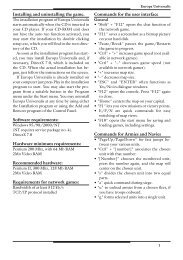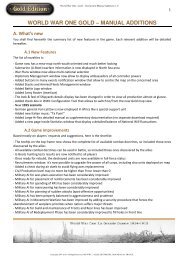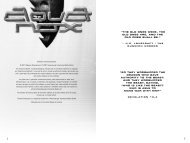Create successful ePaper yourself
Turn your PDF publications into a flip-book with our unique Google optimized e-Paper software.
The US diplomatic level lowers by 1 level per Interphase (start).<br />
Diplomacy with the United States is fairly ineffective, because any attempt<br />
has a 2-column penalty towards the 0 column (on the Diplomatic Table).<br />
It does give the Entente the use of several MUN Sites.<br />
The Panama Canal is closed to the two sides.<br />
Pro-Entente United States<br />
The United States becomes pro-Entente as soon as its level reaches 13.<br />
This level can never later rise above 13.<br />
American diplomacy becomes active and provides 1 American AMB to<br />
Entente each Interphase (and even more afterwards).<br />
The diplomatic level lowers by 1 level per turn. It will lower by 2 levels per<br />
turn, if Russia is no longer in regime A (or has made peace).<br />
The US now supplies Economic aide to the Entente (except Russia).<br />
The Panama Canal is open to Entente.<br />
Entrance into War<br />
At level -5, the United States declares war on the Central Powers.<br />
All the powers of Entente gain NW +3.<br />
The American Army is quasi-non-existent. It will require time to produce<br />
and instruct the American units (see below).<br />
MUN Sites: during each Interphase, 2 to 5 US MUN Sites may still be given<br />
to other Entente powers for production. Nonetheless, certain may be used<br />
by the United States for their own production.<br />
Economic Aide: the United States gives aid to the Allies (this depends on<br />
the Interphases). Russia may now be financed.<br />
The Effect on the Allies<br />
When the United States is at war, Britain, France and Italy each benefit<br />
from the following 2 advantages (not Russia):<br />
+ NW +1 per 2 new US corps landed in Europe (ignore the corps that were<br />
destroyed, then rebuilt). - immediate effect<br />
+ The War Weariness Test is carried out with a -1 bonus.<br />
The Acting German Minority<br />
At the beginning of each Interphase, a test is carried out to determine the<br />
effect of the German minority on the diplomatic level of the United States<br />
(D6): on a 6+, the American level rises by 1 square.<br />
+1 Neutrals Blockade and no Submarine War<br />
+1 Hughes elected president in Winter 1916<br />
158 World War One: La Grande Guerre 1914-1918<br />
The Commercial Submarine “Deutschland”<br />
In May 1916, Germany may receive an event, at the beginning of the<br />
Diplomatic Phase, about the arrival of the Deutschland submarine to<br />
Baltimore. This may happen once per game.<br />
A test takes place to represent the diplomatic impact on the USA (D6):<br />
0–1 -1 US diplomatic square<br />
2–3 nothing modifiers:<br />
3–5 +5 EP and +1 square -1 Submarine War (-2 if All-Out)<br />
6+ +5 EP and +2 squares +1 Neutrals Blockade<br />
+ EP: gain for Germany<br />
+ US diplomacy: the US diplomatic marker goes up (+)/goes down (-)<br />
The American Elections of 1916<br />
In Nov–December 1916, the American elections take place at the end of<br />
the turn. Wilson runs again against Hughes.<br />
A test takes place to determine the ballot result (D12): on 7+ Wilson is<br />
reelected (democrat).<br />
+1 pro-Entente United States<br />
+1 Submarine War (+3 if All-Out)<br />
+2 if a Torpedoing took place in Fall (September to December)<br />
-1 Central Powers blockade (-2 Neutrals blockade)<br />
-1 if a Seizure of Neutral Ships occurred in Fall<br />
-1 war with Mexico<br />
Wilson reelected (democrat): the US level goes up by +2 levels.<br />
Hughes elected (republican): the level goes up by +5 levels. The German<br />
minority is more influential (+1 bonus to the D6).<br />
NB: The two candidates had campaigned against the war, which explains<br />
the rise of the American Level, no matter which president is elected.<br />
Wilson’s Fourteen Points<br />
At the beginning of the Interphase that follows the entrance into war of the<br />
United States and if Wilson is president, Wilson addresses his famous<br />
“Fourteen Points” to all the powers, stating the principles of future peace,<br />
as seen by the Americans.
















